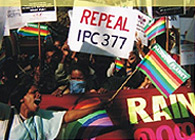In a dramatic development, Nepal became the first country in the South Asian region to elect an openly gay man working for the rights of lesbian, gay, bisexual and transgender and intersex (LGBTI) people as its representative in the Constituent Assembly. This election followed another historic first by a South Asian country - a decision by the Nepali Supreme Court recognising LGBTI people as persons before the law. In short, the South Asian region is going through a dramatic transformation in terms of its attitudes towards notions of gender and sexuality, led wholly by the small Himalayan nation.

The question which the judiciary has struggled with since 1860 is to determine what exactly "carnal intercourse against the order of nature" means. In an obvious echo of Judeo-Christian attitudes, the notion of sex without the possibility of conception has been rendered a criminal offence under Section 377 of the IPC. It has been used by the judiciary over the last 148 years to characterise a homosexual as a "despicable specimen of humanity" and homosexuality as a ""perversion", "abhorrent crime", "result of a perverse mind" and "abhorred by civilised society".
The judicial understanding of Section 377 has remained unaffected by over half a century of human rights jurisprudence under the Indian Constitution. The right to equality, the right to dignity or the right to expression have never been seen fit to apply to lesbians, gay, bisexuals, hijras (a Hindi word to refer to the third sex) or others whose sexual orientation does not conform to the heterosexual mainstream.
This unsympathetic judicial attitude only legitimises and reinforces state power to persecute and harass those of an alternative sexual orientation or gender identity. The enormous power in the hands of the state to enforce its vision of morality finds frightening expression in the form of arbitrary and brutal state action. The known victims of this unpredictable state fury have been HIV/AIDS workers in Lucknow (2003), gay men in Lucknow (2006), hijras in Bangalore (2007) and a British tourist in Goa (2007) who have all been arrested under Section 377.
However, the question of arrests is by no means the whole story of what Section 377 implies for LGBTI persons. One of India's best-known thinkers, Amartya Sen, in an open letter demanding the repeal of Section 377, made the insightful point that the harm from Section 377 was not restricted to cases of actual use but covered the wider canvas of harassment, extortion and victimisation of LGBTI persons by the police. The insidious impact of Section 377 also permeates different social settings like workplaces, families, hospitals and the popular press and ultimately creates a popular understanding of homosexuality as perverse, dirty and illegal. This in turn legitimises violence against LGBTI persons. Section 377 provides the fig leaf of legitimacy to the harassment of LGBTI persons by families, the medical establishment and other official institutions.
The effect of the very existence of this law on actions by authorities right from the medical profession to the police to the National Human Rights Commission should be seriously studied to grasp how Section 377 is a cultural signifier which converts what some people might consider a "private immorality" into a public and prosecutable illegality. The social intolerance fostered by the legal regime of Section 377 results in a terrible situation where lesbian couple after lesbian couple feels they have no option but to commit suicide when faced with the dire reality of the Indian norm of compulsory marriage. Just in the tiny state of Kerala, over 23 couples have committed suicide rather than be forced into marriage. Section 377 is thus a visible symbol of all that is wrong with a social order that has little tolerance for any sexual expression outside the heterosexual norm.
It is indeed unacceptable that in 21st-century India we still have a law which denies "the right to love" to a section of the Indian population. If the constitutional promise of equality is to have any meaning at all, then homosexuals too, like heterosexual married couples, should have the freedom to engage in intimate sexual acts without being subjected to state harassment. The simple logic being that a colonial law based on pure animus towards one section of the population has no place in a modern democratic society. The question is whether India will live out the meaning of its creed as the world's largest democracy or will keep company with fundamentalist and tyrannical regimes, to be seen in certain parts of the globe, by continuing to retain the archaic Section 377 of the IPC.
This column was first published in The Indian Express on May 21, 2008 and is republished with permission from the writer.
Arvind Narrain is a human rights lawyer with the Alternative Law Forum. He is the author of Queer: Despised Sexuality, Law and Social Change (2004) and co-editor of Because I Have a Voice: Queer Politics in India (2005). He can be contacted at arvind@altlawforum.org











 Printable Version
Printable Version










Reader's Comments
At times it would seem easy, for the sake of survival, to settle with keeping my private affairs to myself. I do love my comfort zone, enjoying the spoils of assimilating with the pretence of silent denial.
When it seems that we are protesting too much, overstretching that 'tolerance' towards us, I would remember Christy and Rukami, whose plight laments at the injustice and oppression that exist. In that light, what we protest for does not seem excessive. It has become a cause to pick my battles.
Democratic countries should impose tough sanctions on places that discriminate and kills it's citizen in the name of JUSTICE is it a JOKE . sadly not .
The powerful prose which we would expect from a lawyer.
I'll try to find your books on Amazon....
Keep the flag flying!
Please log in to use this feature.